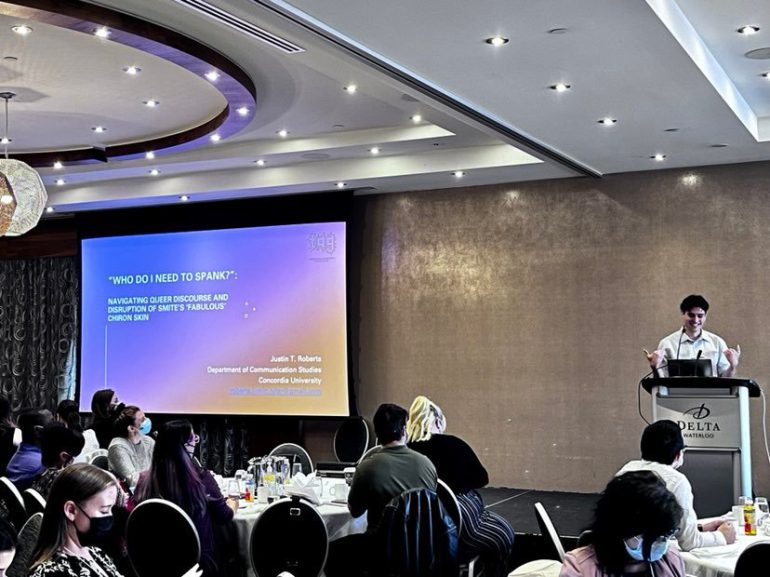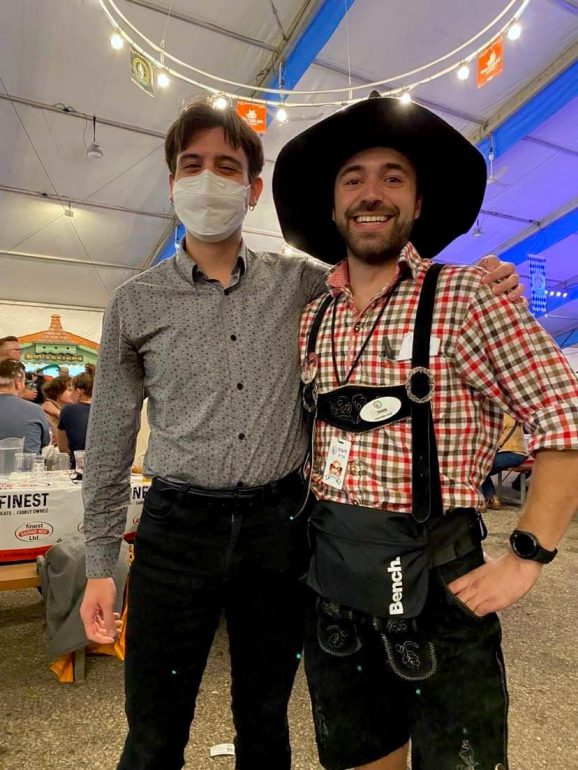Earlier this October, I had the exciting opportunity to represent the Technoculture, Art, and Game Research Lab at the Canadian Sex Research Forum’s (CSRF) annual meeting in Waterloo, Ontario. CSRF is an organization that aims to bring together a multidisciplinary group of professionals working in the area of human sexuality in Canada. Every year they host their annual meeting in different areas across Canada to share information and ideas between students and faculty members. This year, CSRF appointed student ambassadors to reach out to a variety of different research fields, in order to diversify the conference program; considering presentations that relate to sex and sexuality in its broadest form.
I admit that when I first saw the call for abstracts, I didn’t know much about CSRF or the work that they did. I almost dismissed the call for submissions entirely were it not for the interest in reaching out to other fields. Did I think my research interests in queer play “fit” the conference? Not necessarily. But at the time I was eager to present my work and I wanted the chance to exchange ideas with people outside of my usual academic circles.
My abstract is a readapted version of a paper I wrote while in the Communications Undergraduate program, which later became the foundation for my current research interests. Entitled “‘Who Do I Need to Spank?’ Navigating Queer Discourse and Disruption of Smite’s ‘Fabulous’ Chiron skin”, my paper was an analysis of the skin’s presentation and use in the digital space it occupied. Smite is a Multiplayer Online Battle Arena game, where players take on the roles of gods and goddesses to battle it out in one of two teams. Skins are cosmetic options purchasable by players, that change the aesthetics of the player avatar. Chiron is one of the playable gods in Smite and his “Fabulous” skin is the first and only LGBTQ+ themed skin in-game. The skin’s use of stereotypes relating to gay men in its appearance and voice lines sparked an internal discourse for me, during one of my casual play sessions. It was important for me to explore this further, especially since online multiplayer games are commonly considered toxic environments for marginalized players. My analysis was two-fold: firstly, placing the skin within queer gaming history and its use of caricature, and secondly, reimagining the skin as ripe with queer possibility in regard to camp. So, after a lot of preparation and amazing support from my supervisor and peers, I was ready to set off for Waterloo.

Presenting “Who Do I Need To Spank” in the CSRF conference hall, at the Delta Waterloo. October 14th, 2022.
My first day there felt reminiscent of my first day at school. You know that feeling when you walk into the cafeteria with your stuff in hand and look out at the many tables full of new faces? At that moment I became aware of the space I was taking, unsure of what I was doing or where I should sit. After some pacing, I eventually found a spot and introduced myself. From then on things became a little less daunting. Many of the people I met made me feel welcomed and showed genuine interest in the work I was doing. CSRF was full of thought-provoking research on sex and sexuality in Canada, and though not everything fit with my interests, it was enriching to be in a new and different academic space. It helped me to shake off the anxiety that a presentation about a Drag Race quoting unicorn wouldn’t resonate with people coming from such different fields of study. After my presentation, I appreciated that people ask me questions at the various social events that CSRF had planned. Many CSRF members took the time to introduce me to their work and concepts they believed I’d find relevant. It was a very affirming experience. Though, my personal favorite event was getting to party with everyone at Oktoberfest, which was nothing short of an absolute blast.
Now did everything I experience at CSRF translate to my work? Of course not, but that’s to be expected!
I enjoyed engaging in conversations with people about my work despite them not being very familiar with Game Studies. My goal was to step out of my comfort zone and learn from new perspectives, and I’m happy to say my trip fulfilled that goal. I also hope that my experience encourages others, who are thinking about doing the same.
I was also very honored to receive runner-up for Best Student Presentation at CSRF. A moment that had me so in shock that, when I finally realized I should head to the stage, I nearly tripped on the way there. I’m grateful for the recognition and happy to have represented TAG at this event. I want to give a big thank you to the organizers of CSRF for their work and for making me feel so welcome. Thank you to everyone I met at Waterloo who gave me such wonderful encouragement and feedback. Lastly, thank you to TAG, my supervisor, my peers, and my friends for their support in getting me to Waterloo. It really made all the difference.

Enjoying the Oktoberfest festivities 🙂
